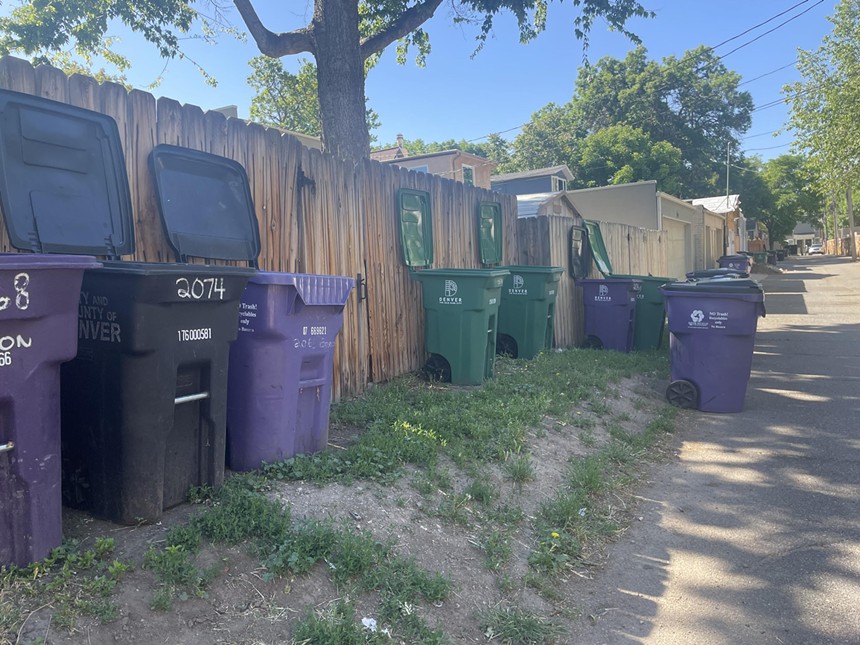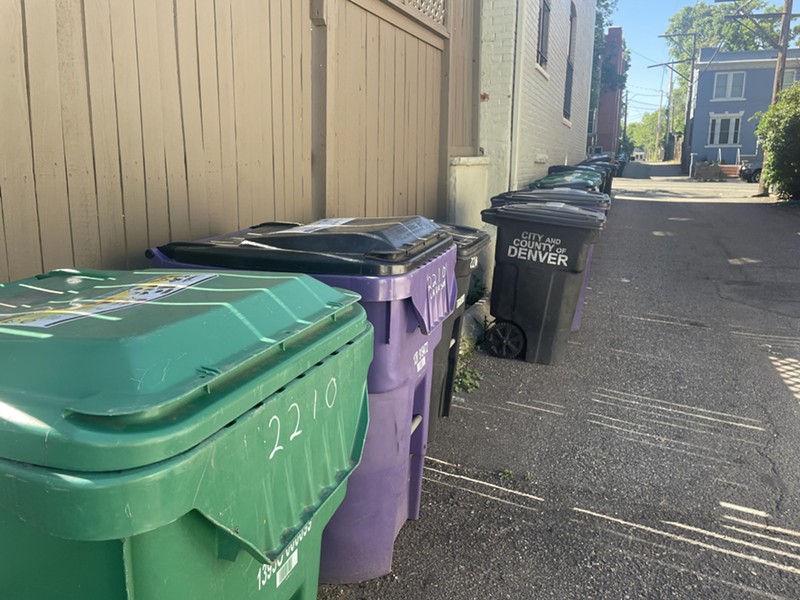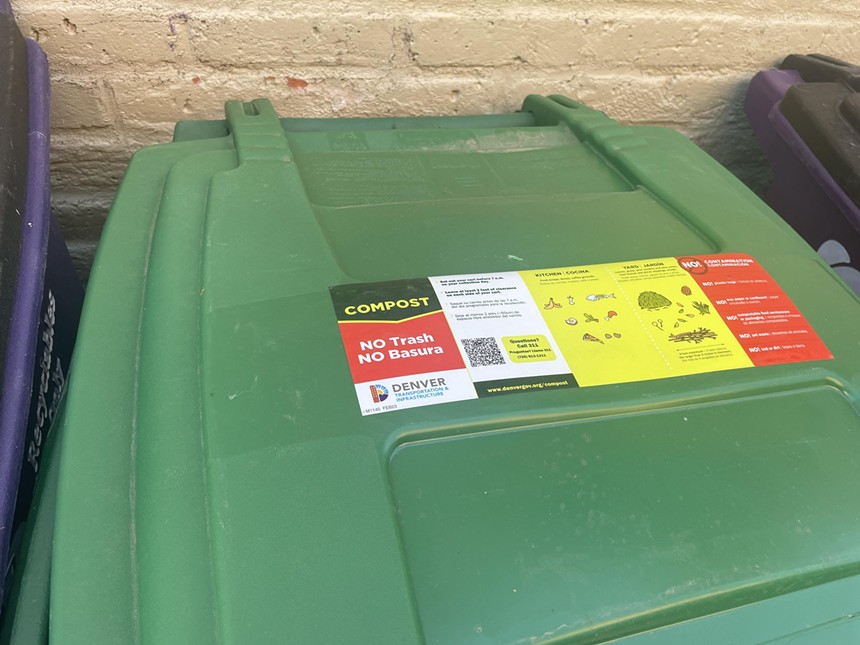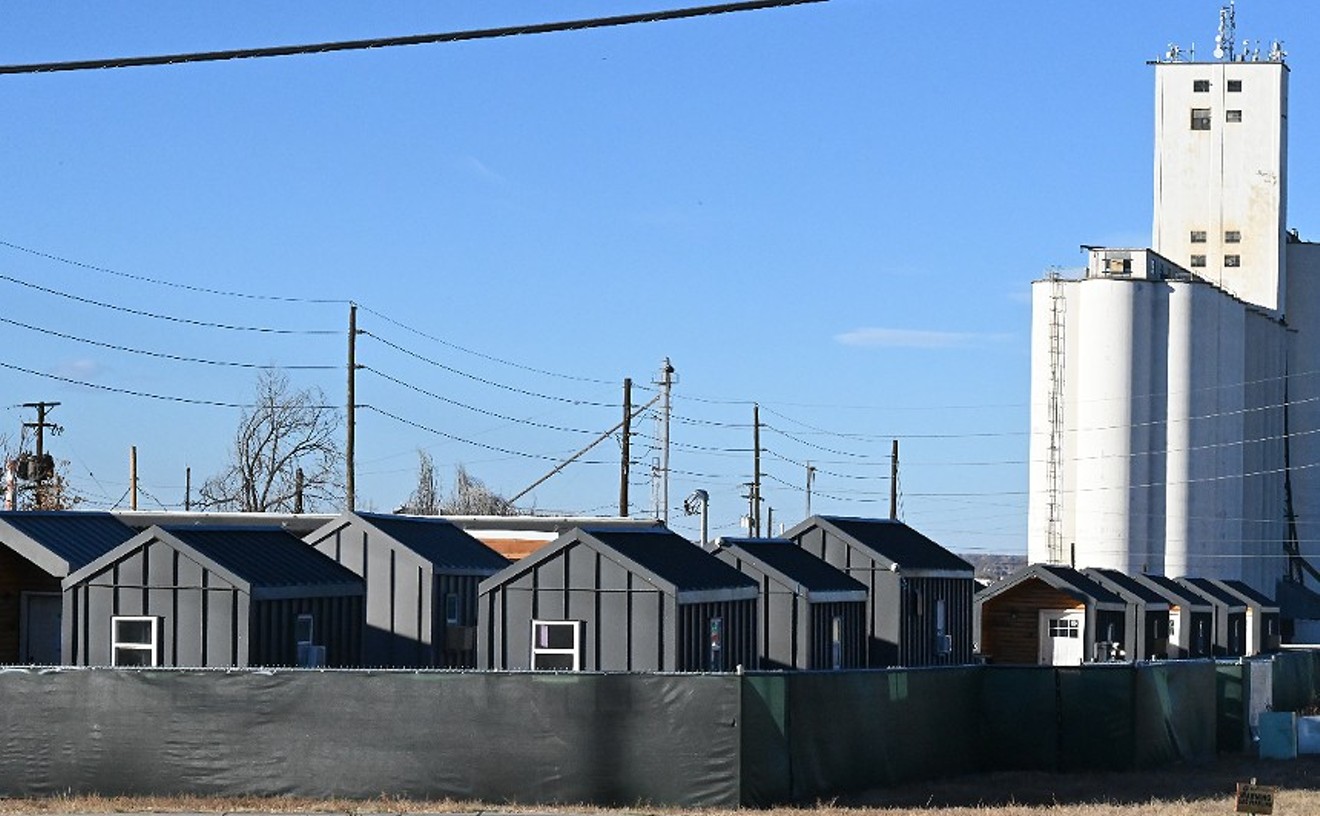“I’m a big believer in Denver, and I want to do things wisely and efficiently,” says Marty Jones, a Denver musician and writer (and longtime Westword contributor) who lives in Five Points, part of Solid Waste Collection District 2.
That district was one of the first to receive compost bins last summer as part of the city’s new waste services system, but composting hasn’t been widely adopted or efficient in Jones’s experience.
He goes out on a weekly compost walk to see how many of his neighbors are using their green compost carts, and the results haven’t been good so far, with over half the bins in the alleyways regularly left empty or not placed for pickup.
Two years ago, Denver City Council approved a new Pay As You Throw trash system, where every resident would get new compost carts and weekly recycling pickup, up from every other week. Instead of paying for trash pickup out of the city’s general fund, residents now select the bin size they want and pay accordingly.
The goal is to increase Denver’s poor waste diversion rate. But so far, only 3 percent more waste has been diverted from the landfill citywide, going from 23 percent in 2022 to 26 percent in 2023.
Since 2023, about 12,000 new residences received compost carts. Denver’s Department of Transportation & Infrastructure (DOTI) serves around 180,000 residential customers, and the department plans to roll out compost carts fully by the end of 2025.
Although some city officials and residents have complained that the rollout is too slow, Jones believes it needs to be rethought as it moves forward. “Oh, no, because it’s a flop,” he remembers thinking when he saw the plan to expand the compost program as is.
Over Half the Compost Bins in Five Points Sit Empty
On May 30, Westword joined Jones for a compost walk. That day, out of 92 bins visible from four blocks' worth of alleyways in Five Points, 27 weren’t placed for pickup and 21 were empty, for a total of 52 percent of bins unused. Seventeen bins were 100 percent full, mainly containing yard trimmings after people had put in work over Memorial Day weekend to get their yards ready for summer. The rest ranged from 10 percent to half full, with 25 bins falling in that range.
Those results are slightly more positive than surveys Jones conducted on June 5 and May 22, which both showed over 60 percent of bins empty or not placed for pickup and only sixteen bins completely full.
The city allows people to opt out of composting if they are not interested; people can also elect smaller or larger green bins. Because DOTI noticed many people in this area weren't using their carts, the department now sends letters to residents in upcoming rollout areas, asking them to select a green cart size so it can be sure only those who will compost are sent a cart. Carts from this area that look unused will be removed as time allows, according to the department.
Right now, many empty bins look completely untouched, however.

Most bins in Five Points that were pushed up against the wall are empty and not put out for pickup.
Catie Cheshire
“Anyone that's paying attention, I think, would realize that this program is not a success,” says Tonia Frundt, who lives in Jones’s neighborhood. Frundt is on the neighborhood board with Jones and went out to conduct a similar compost survey in the blocks around her home after hearing the results of Jones’s. She found that most bins were empty or less than 10 percent full.
DOTI’s strategy has been to expand each of its nine Solid Waste Collection Districts, one at a time, prioritizing areas with the lowest diversion rates. Though Jones and Frundt both paid for the optional compost program, most in their solid waste district hadn’t, which is why Five Points got bins first.
“We prioritized these areas in our citywide rollout efforts to broaden the program’s reach,” says Cyndi Karvaski, a spokesperson for DOTI.
Frundt argues that prioritizing those who excelled at recycling or had more people involved in composting might have been more successful.
“I get why ours was rolled out early, because there probably were a lot of people here that weren't doing it,” she says. “Those people are still not going to do it. … You give them a bin, they're going to be, like, ‘What the hell is this?’ and they're going to put it in the alley, and they're going to go on with life.”
DOTI has been working to educate customers as compost bins roll out, ensuring what gets placed in compost bins isn't contaminated. On May 30, there was one contaminated bin containing an aluminum pie tin, which had been noted by the city with educational materials taped to the bin’s handles.
However, Jones worries that education can’t compel people to use the bins. He fears the program may not be carbon-neutral, because the emissions from trucks rumbling through alleys each week may not outweigh the gains from what little gets composted.
“It seems incredibly wasteful to pick up bins that are less than 50 percent full,” Jones notes, "if you consider the time every week and the fuel for the truck.”
According to Karvaski, organic materials, like yard trimmings and food scraps that can be composted, are the largest component of the residential waste stream in Denver.
“That material in the landfill releases methane, so pulling it out of that environment and back into the production cycle is an important opportunity to reduce Denver's impact on the climate,” she says. “Because Denver's compost is processed locally next to the landfill, the emissions from fuel specifically are low and the same as landfilling.”
Suggestions to Improve Denver Composting
Jones and Frundt suggest changing the frequency of pickup, especially during the winter months, when there aren’t yard clippings. Jones says when he casually polled his neighbors, they were happy with weekly recycling pickup but said it’s too often for compost. “It's great in the fall when we have all those leaves,” Frundt adds. “But that's three weeks out of the year that it’s great.”
Jones suggests emptying the bins weekly or every other week in the summer and fall, and every three to four weeks in the winter and spring. Also, he thinks the city should explore placing six to eight large green bins in each alleyway for neighbors to share to help decrease the burden on DOTI’s workforce and to ensure that bins are full when pickup time comes.
Through Karvaski, DOTI says it plans to look at new ideas to serve customers the best it can as the program grows.
Compounding the problem, the City of Denver’s previous composting contractor, A1 Organics, decreased acceptable materials last year from a wide range of materials to just food scraps and yard waste. Previously, non-recyclable paper products like napkins were also allowed. Denver has switched to using Waste Management as its composting contractor, but Karvaski says the decision to accept fewer materials was region-wide and applies under Waste Management.
“The compost guideline changes in 2023 were not related to the citywide rollout,” she says. “This was a regional change by processors due to increased contamination — not only in Denver, but all along the Front Range. This further highlights the importance of education as we grow the service to ensure that residents are confident in what they're putting in the cart.”
But Frundt says it’s unfortunate that fewer materials are accepted just as more people can access composting. Her family used to only dispose of one bag of trash weekly but fill their compost and recycling bins. Now their trash volume has doubled while their composting has shrunk, she says.
“It went from a great program to kind of useless in my opinion, and I think that's why people aren't using it,” Frundt says.
Jones says he and his wife are avid composters, but only fill about three three-gallon bags of compost each week now.
(Compost Manufacturers Alliance three-gallon bags join food waste and yard debris as the only items eligible for composting year-round in Denver. From April through June and September through November, paper yard waste bags are also accepted.)
Even if standards change, Frundt doubts the Denver population’s ability to get on board.
“You can't make people care about something that they don't care about and follow the rules properly,” she says. “A lot of people, I think, feel like they were sold a bill of goods by the city. … Now that we're paying, it's a worse service than it was before.”
Jones is an optimist. He says if DOTI wants help with the rollout, the department could reach out to Denver’s many artists, poets and songwriters to get people excited about the prospect. He offers his talents to create a composting theme song for the city (and he already has a tune: “When Life Hands You Crap, Make Compost”).
“When life hands you lemons, make lemonade / Fill up your glass and raise a toast / If you’re saying goodbye to the things you love most / When life hands you crap, make compost,” Jones sings.
If you ask him, Denver still has a chance to make composting not so crappy.
This article was updated on June 12 to include additional comments from the Denver Department of Transportation & Infrastructure.













